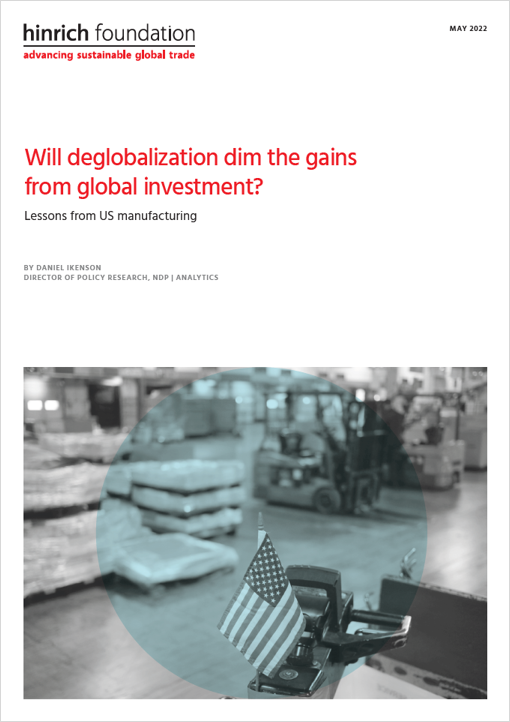Published 04 May 2022
Foreign direct investment (FDI) has been essential to many economies and integral to the process of globalization. In recent years, the benefits of FDI are threatened by geopolitical risks and chronic supply chain disruptions. However, any security gains achieved from the retrenchment of trade must be measured against its costs.
In 1982, amid growing trade tensions and persisting problems in the US auto industry, the first foreign nameplate automobile ever produced in the United States rolled off Honda’s new assembly lines in Marysville, Ohio. Since then, Japanese car companies in aggregate have invested more than US$51 billion across 28 US states, directly and indirectly accounting for 1.6 million jobs in the country.
The dividends accruing to the US economy due to this kind of inward foreign direct investment (FDI) have been substantial in both absolute and relative terms. Without the participation of foreign companies in the United States, US manufacturing GDP growth rate would have been between 8.4% to 20.9% (US$177 billion - US$463 billion) lower than it was in 2019.
The benefits of FDI are not unique to the US. FDI is not only a source of capital investment, but also a facilitator of technology, expertise, and best business practices around the world. Unfortunately, these benefits are threatened by the specter of deglobalization.
This paper by Daniel Ikenson of ndp | analytics examines some of the potential costs of deglobalization. First, it describes and quantifies the benefits of FDI to the overall US economy. Second, it focuses on the contributions of US affiliates of foreign companies to the US manufacturing sector. Third, it considers the potential impact of dissipating FDI on US manufacturing. Finally, the paper reminds the readers of the potential costs of deglobalization to the US economy which would be even more significant in the many economies that are heavily dependent on FDI.
This analysis is part of a series of papers by Daniel Ikenson that highlight the importance of trade and investment to both developed and developing economies. Access other papers here:
© The Hinrich Foundation. See our website Terms and conditions for our copyright and reprint policy. All statements of fact and the views, conclusions and recommendations expressed in this publication are the sole responsibility of the author(s).







